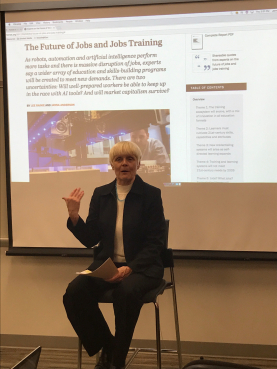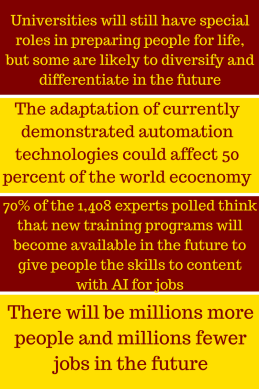By Matt Holzapfel
In other news today, robots are taking over the world, for real this time…..well, not really. The Pew Research Center recently released a report titled “The Future of Job Skills and Job Training” centered around the idea that humans may soon be forced to learn new skills in order to compete with artificial intelligence, yes robots, who could be taking their jobs.
The report, done by Pew Research Center Internet, Science and Technology research expert Lee Rainie alongside Elon Professor and Director of Elon’s Imagining the Internet Center Janna Anderson explores what exactly humans will need to do to keep up with machines. “Most experts expect that education and jobs-training ecosystems will shift in the next decade to exploit new virtual and augmented reality tools and artificial intelligence,” the report says. “Liberal arts-based critical-thinking-driven curriculums; scaled-up apprenticeships and job mentoring and micro-credentialing of new competencies”

Elon Professor Janna Anderson speaks to a class about what the new-age of technology will mean for jobs in the future
“Things are constantly changing,” said Anderson. “Five years from now will Facebook exist? MySpace doesn’t exist anymore, imagine that applied to all these job indicators. That’s why we have to be flexible, resilient, creative and innovative moving forward.” The Pew Research Center’s report also surveyed 1,408 people about the emergence of new educational and training programs built to train large numbers of workers in the skills they need to compete for jobs with AI. 70% of those polled said that they do expect new approaches will emerge and be successful, while 30% said they do not expect such a thing.
“I’ve actually done a little bit of research on that,” sophomore Griffin Evans said when asked about what skills should be taught to people in the workforce that want to keep their jobs safe from AI. “So many politicians are concerned about the jobs that we’re losing overseas, but we’re actually losing 60% more jobs to artificial intelligence than we are to countries overseas.” Sophomore Evan Sassaman pointed out that there will always be some skills that you just can’t program a robot to have that a human does. “People need social skills now more than ever because technology is taking over so many things,” said Sassaman. “It’s easy for people to become more isolated and feel as if they don’t need to communicate or work well with others. Communication is key for so many things, and there needs to be a greater emphasis on that.”
While Evans said that he does buy into the newfound fear that “robots are stealing our jobs,” Sassaman had a different point of view. “I do not currently buy into the ‘robots are stealing our jobs craze,’ however I am nervous about where robots could go in the future. For example, things like self-driving cars just make me nervous, and I’m worried that people will become too reliant on these things.

Points from the Pew Research Center’s Report; Graphic by Matt Holzapfel (canva.com)
“The vast majority of these experts wrestled with a foundational question,” explains Anderson in the report. “What is special about human beings that cannot be overtaken by robots and artificial intelligence?” That same question is likely what has allowed humans to maintain a slight edge on AI for the past decade, but the gap is slowly shrinking. “I hope such training programs could exist,” exclaimed Sassaman about the future success of training and educational programs that could boost the repertoire of skills that humans have that AI doesn’t. “I think anything that could give humans an edge over robots would be great. Too often we hear of corporations wanting to replace workers with automated machines because they’re cheaper and faster so anything to give humans an extra edge would be beneficial.”

Elon Sophomore Griffin Evans thinks that we should be paying more attention to the jobs we’re losing to AI than to the ones we’re losing overseas
When asked the same question, Griffin Evans said it was a possibility, but it depends. “It depends on the situation and where the AI is used,” he said. “Any field where it’s doing the same mundane task over and over again is more favorable to the AI no matter what. I can see places where an actual person would perform better than a robot though, like in medicine or broadcasting.” For now, humans can rest easy, however, as it seems like we’re still a few years away at the least from a major breakthrough that could allow artificial intelligence to partially or completely take over a job industry. Even then, there are many industries where we just don’t have the technology to make AI do the type of complex tasks that humans can, meaning human labor is still one of the most invaluable resources on the planet.
For more information about the Pew Research Center and their studies on artificial intelligence, click here. To read why Professor Anderson says the “robot takeover” may already be upon us, check out her article on medium.com.
Advertisements Share this:



![Troubled Waters (Montana Rescue Book #4) by [Warren, Susan May]](/ai/054/036/54036.jpg)
